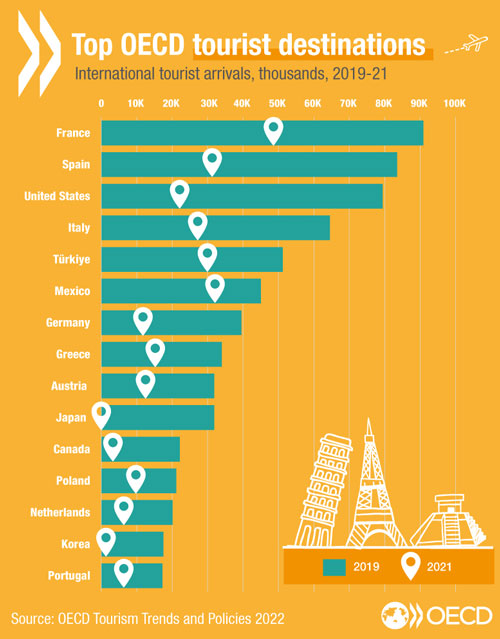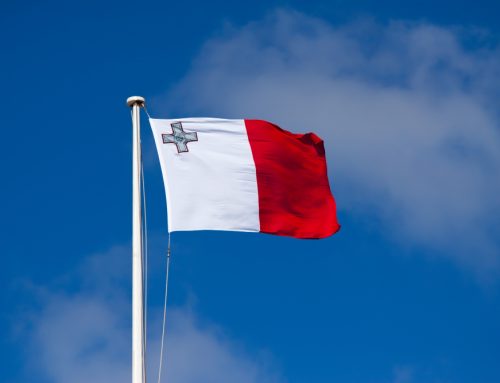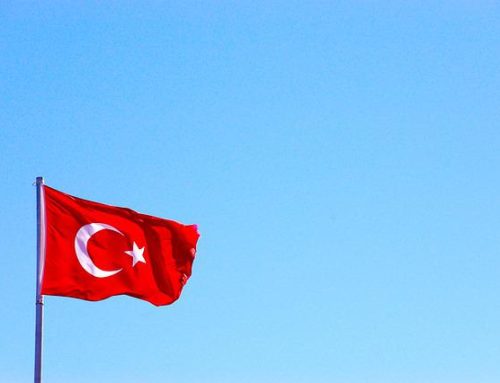December 14, 2022
A post-pandemic recovery in tourism risks faltering as the global economy loses momentum amid the energy shock triggered by Russia’s war of aggression against Ukraine, high inflation and weakened household purchasing power, according to a new OECD report.
OECD Tourism Trends and Policies 2022 says many countries saw a strong rebound in tourism in 2022 on the back of pent-up demand, household savings and travel vouchers. However, international tourism is now not expected to recover until 2024 or 2025, or even later.
After six decades of consistent growth, the sector was dealt a huge blow by COVID-19. International tourism came to a near complete halt at the height of the pandemic, which accounted for 77c of every USD 1 of lost revenue in service exports in OECD countries in 2020. With domestic tourism also constrained, tourism’s direct contribution to GDP fell by 1.9 percentage points in OECD countries with available data.
COVID-19 highlighted the vital role tourism plays in global, national and local economies, says the report. Before the pandemic, tourism directly contributed 4.4% of GDP and 6.9% of employment, and tourism generated 20.5% of service-related exports on average in OECD countries.

The latest evidence indicates that tourism has performed above expectations in many countries. International tourist flows in July 2022 were just 19.9% below July 2019 levels across reporting OECD countries, although there were marked variations across regions. Arrivals in Denmark, Greece, Luxembourg, Portugal, Slovenia and Spain exceeded 2019 levels but in countries bordering Russia and Ukraine, tourist numbers were at least 30% below pre-pandemic levels in July 2022. In OECD countries in the Asia Pacific region tourist arrivals were at least 40% lower than in 2019.
“The pandemic exposed underlying weaknesses in the wider tourism economy,” OECD Secretary-General Mathias Cormann said. “Fallout from Russia’s war of aggression against Ukraine is now threatening the sector’s recovery. The challenge for governments and businesses is not only to boost tourism in the short-term, but to also ensure the sector’s longer-term strength and sustainability.”
Tourism businesses, already struggling to recover from the pandemic, are now also facing rising energy, food and other input costs. The sector faces huge uncertainty regarding labour and skills shortages which further risk constraining recovery. Restoring safe mobility is also required to bring back traveller confidence and tourism demand.
To support recovery and to transform the tourism sector, policy action is needed to:
- Strengthen collaboration across government, and with the private sector, to support recovery and shape a brighter future for tourism. For example, the United States National Travel and Tourism Strategy 2022 draws on engagement and capabilities from across the Federal Government and will be implemented under the leadership of the Tourism Policy Council and in partnership with the private sector.
- Secure a robust and stable tourism sector that is more resilient to future shocks – the pandemic and cost-of-living crisis have underlined vulnerabilities in the sector and the need to build the capacity of government and business to react and adapt quickly, develop tailored destination management approaches and promote a business environment where SMEs can succeed. For example, the Chile Supports Tourism 2022 Programme (launched in July 2022) is designed to finance training, business planning, consultancy, technical assistance, working capital and/or investment projects to support the reactivation of tourism SMEs.
- Take sustained and transformative action to promote a green tourism recovery. For example, Norway has developed the CO2RISM calculator to estimate the amount of transport-related CO2 emissions associated with visitors travelling to and within Norway and is one of several operational tools to support destinations shift to more sustainable tourism planning and development under the National Tourism Strategy 2030.
Source: OECD
Legal Notice: The information in this article is intended for information purposes only. It is not intended for professional information purposes specific to a person or an institution. Every institution has different requirements because of its own circumstances even though they bear a resemblance to each other. Consequently, it is your interest to consult on an expert before taking a decision based on information stated in this article and putting into practice. Neither Karen Audit nor related person or institutions are not responsible for any damages or losses that might occur in consequence of the use of the information in this article by private or formal, real or legal person and institutions.






